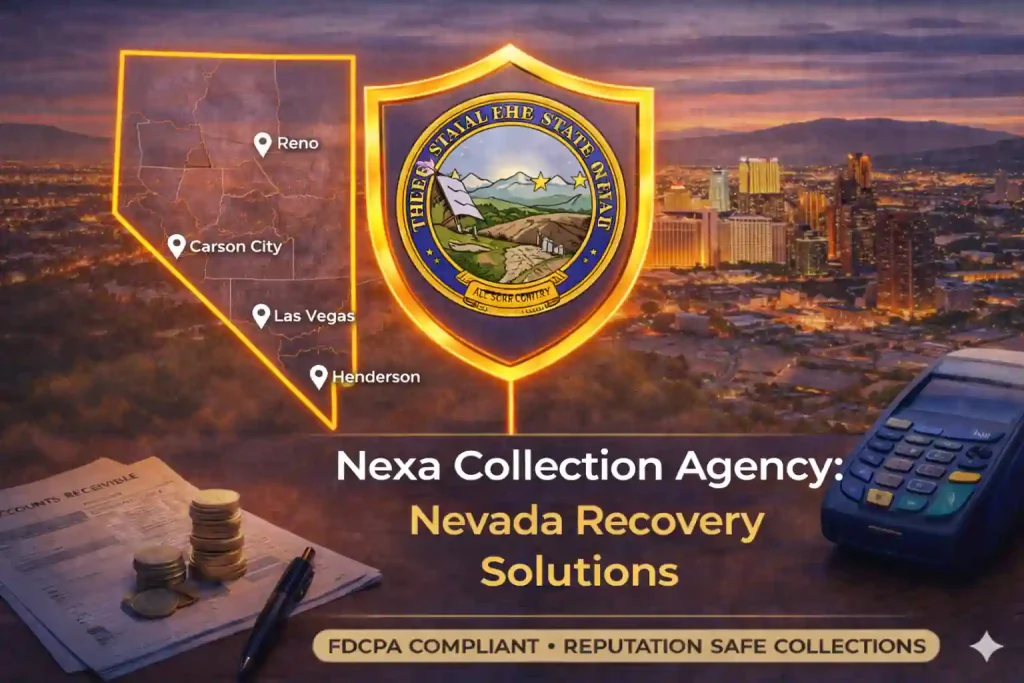In Nevada—from the high-velocity gaming and tourism sectors of Las Vegas and Henderson to the logistics powerhouses of Reno and Sparks—cash flow is the lifeblood of the desert economy. But as of January 1, 2026, the legal landscape has shifted. With the full implementation of AB 204, medical debt collection is now under a 180-day “extraordinary action” freeze, and Nevada’s $10,000 automatic bank exemption has made traditional asset seizures more complex than ever. You don’t just need a collector; you need a Nevada-licensed strategist who knows how to break through these new shields using surgical mediation and sophisticated skip-tracing.
Nexa provides 100% reputation-safe, equipped with all 50-state collections license, offering free credit reporting, free litigation/bankruptcy scrubs, and zero onboarding fees. Secure – SOC 2 Type II & HIPAA compliant.
Need a Collection Agency? Contact us
The Nevada Legal Landscape
Nevada offers one of the strongest “Statutes of Repose” for written contracts in the West, but new debtor protections require a “compliance-first” approach to avoid FID penalties.
| Debt Category | Statute of Limitations | Nevada Law (NRS) |
| Written Contracts | 6 Years | NRS § 11.190(1)(b) |
| Oral / Open Accounts | 4 Years | NRS § 11.190(2)(c) |
| Medical Debt | 6 Years | AB 204 / SB 248 Rules |
| Wage Garnishment | 18% – 25% Cap | NRS § 31.295 |
| Judgments | 6 Years (Renewable) | NRS § 11.190 |
Critical Nevada Rules for 2026:
-
The 180-Day Medical Freeze (AB 204): As of 2026, health care entities and agencies are prohibited from “extraordinary collection actions”—including credit reporting, lawsuits, or garnishments—until 180 days after the first bill. Nexa’s specialized medical workflow ensures you stay compliant while maximizing early-stage “soft” recovery.
-
The $10,000 Bank Shield: Nevada law now protects up to $10,000 in a debtor’s bank account from attachment. Nexa uses advanced asset-scrubbing to identify accounts that exceed this threshold, ensuring your legal spend is never wasted on “exempt” funds.
-
SB 248 Notice Requirements: Before any action is taken on medical debt, a specific 60-day notice must be sent via registered/certified mail. Our systems are hard-coded to automate this, preventing the technical errors that lead to dismissed cases.
-
Garnishment Math: Nevada limits garnishment to the lesser of 25% of disposable earnings (18% if weekly wages are under $770) or the amount by which income exceeds 50x the federal minimum wage.
Cost-Effectiveness: The Nexa Advantage
-
Fixed-Fee Recovery ($15/account): Best for high-volume, early-stage debt. Debtors pay 100% directly to you.
-
Contingency Service (20%–40%): Performance-based recovery. No Recovery, No Fee.
Industries We Serve in Nevada
-
Logistics & Distribution: B2B recovery for the Reno-Tahoe and North Las Vegas hubs. We handle high-value freight brokerage and warehousing disputes for the “Crossroads of the West.”
-
Healthcare & Medical: 100% HIPAA-compliant. We are the masters of SB 248 and AB 204 compliance, helping Vegas and Henderson practices recover funds without violating the 180-day extraordinary action ban.
-
Gaming & Entertainment: Specialized recovery for unpaid markers, corporate events, and vendor disputes in the world’s entertainment capital. We do not collect gambling related amounts.
-
Colleges & Universities: From UNLV to UNR, we handle tuition fee recovery and housing balances, balancing firm tactics with the need to preserve institutional reputation.
-
Accountants & CPA Firms: Recovery of professional service fees. We understand the Nevada business tax cycle and ensure you get paid without damaging client rapport.
-
Banks & Credit Unions: Expert handling of delinquent consumer loans and deficiency balances using Nevada’s 6-year judgment renewal window.
-
Construction & Trades: Revenue recovery for HVAC, electrical, and general contractors. We specialize in NRS Chapter 108 (Mechanic’s Liens) to secure your right to payment.
-
B2B Commercial & Restoration: High-speed recovery for service providers in the booming Nevada restoration and commercial waste sectors.
Recent Nevada Recovery Results
Case 1: Las Vegas Multi-Specialty Surgery Center (Medical)
-
The Problem: $155,000 in aging patient debt. The client was paralyzed by the new AB 204 notice requirements and 180-day freeze.
-
The Result: Nexa implemented a compliant “Step 1” notification system, recovering $92,000 in 75 days purely through mediation, avoiding the need for “extraordinary actions.”
Case 2: Reno Logistics & Freight Broker (B2B)
-
The Problem: A $48,000 unpaid freight invoice from a California-based vendor using a Reno warehouse.
-
The Result: Utilizing Nevada’s 6-year written contract statute and a formal pre-legal demand, Nexa secured a full $48,000 recovery plus interest in just 19 days.
Frequently Asked Questions (FAQ)
1. Can I still sue for medical debt in Nevada?
Yes, but only after the 180-day freeze and the 60-day notice period have passed. Nexa manages this timeline for you to ensure your lawsuit isn’t dismissed on a technicality.
2. What is the $10,000 bank exemption?
Nevada protects the first $10,000 in a debtor’s bank account from being seized by creditors. We skip-trace for high-net-worth indicators to ensure we only target accounts that are legally reachable.
3. Does Nexa handle credit reporting?
Yes. For all eligible non-medical accounts, we report to the major bureaus. For medical debt, we follow the 180-day reporting delay required by 2026 law.
Popular cities:

